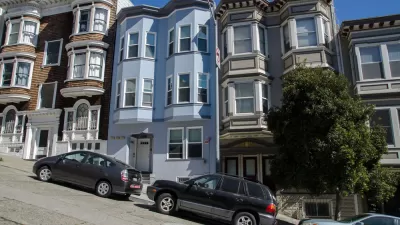A proposal under consideration by the San Francisco Board of Supervisors would eliminate parking requirements citywide.

"San Francisco is poised to become the first big U.S. city to no longer require developers to include at least some parking in their housing developments," reports Joshua Sabatini. San Francisco would follow Hartford, Connecticut—the first city to end parking minimums citywide—and Buffalo, New York, which also passed similar legislation, with a few caveats.
For the city to implement this drastic overhaul of its parking requirements, it will have to pass legislation introduced by Supervisor Jane Kim, who recently discussed the proposed legislation at a public hearing.
“It would not prohibit parking in any redevelopment. It would merely remove the requirement that a developer would have to build a minimum number of parking spaces,” Kim said during Monday’s Land Use and Transportation Committee hearing.
Kim also says that the city is already working around parking requirements for most developments.
Arielle Fleisher, a representative for public policy think tank SPUR, is also quoted in the article discussing the benefits of ending parking requirements.
“There is no good reason for the city to force the private market to produce parking spaces for every housing unit built,” said Arielle Fleisher, a representative for public policy think tank SPUR. “Eliminating minimum parking requirements reduces the cost of producing new housing and enables us to use our land more efficiently by replacing spaces for cars with spaces for people.”
More advocates are cited in the article as supporting the legislation. The full San Francisco Board of Supervisors is expected to vote on the bill next week.
FULL STORY: SF to do away with minimum parking requirements for developments

Planetizen Federal Action Tracker
A weekly monitor of how Trump’s orders and actions are impacting planners and planning in America.

San Francisco's School District Spent $105M To Build Affordable Housing for Teachers — And That's Just the Beginning
SFUSD joins a growing list of school districts using their land holdings to address housing affordability challenges faced by their own employees.

The Tiny, Adorable $7,000 Car Turning Japan Onto EVs
The single seat Mibot charges from a regular plug as quickly as an iPad, and is about half the price of an average EV.

Seattle's Plan for Adopting Driverless Cars
Equity, safety, accessibility and affordability are front of mind as the city prepares for robotaxis and other autonomous vehicles.

As Trump Phases Out FEMA, Is It Time to Flee the Floodplains?
With less federal funding available for disaster relief efforts, the need to relocate at-risk communities is more urgent than ever.

With Protected Lanes, 460% More People Commute by Bike
For those needing more ammo, more data proving what we already knew is here.
Urban Design for Planners 1: Software Tools
This six-course series explores essential urban design concepts using open source software and equips planners with the tools they need to participate fully in the urban design process.
Planning for Universal Design
Learn the tools for implementing Universal Design in planning regulations.
Smith Gee Studio
City of Charlotte
City of Camden Redevelopment Agency
City of Astoria
Transportation Research & Education Center (TREC) at Portland State University
US High Speed Rail Association
City of Camden Redevelopment Agency
Municipality of Princeton (NJ)





























